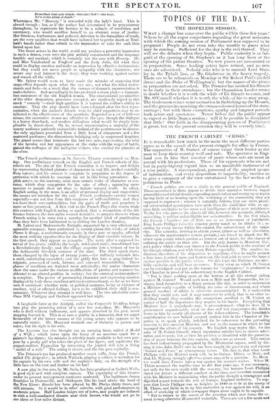- The'French performances at St. James's Theatre commenced on Mon- day.
One preliminary remark on the English and French schools of his- trionic art. The aim of the French comedian is to impress and delight by-representing finished pictures of characters in real life, studied carefully from nature; and his success is complete in proportion to the degree of perfection with which he conceals his art in this living portraiture. En- glish actors, on the contrary, seize upon certain traits of character or cos- tume, which they exaggerate for the sake of effect ; appearing more anxious to parade their art than to imitate natural truth. In effect, English•aeting, in the mass, is an affair of personal display and stage-trick; the means are mistaken for the end. French perfonners—pretty women especially—are not free from this weakness of self-exhibition; and they too have their conventionalities: hut the guise of truth and propriety is more or less preserved. A first visit to the French Plays this season made this contrast with English acting so marked, that a recognition of the dif- ference-between the two styles seemed desirable, to prepare those to whom French acting is in some sort a novelty, for another kind of gratification than they have been habituated to in visiting the London theatres.
Lafont and Mademoiselle Nathalie, supported by a very efficient and agreeable company, have performed in several pieces this week; of which Pierre is Rouge, a melodramatic comedy, in three acts or epochs, afforded the most striking opportunities for the display of their versatile talents. In the first epoch, they appear as peasants. The next, after a supposed in- terval of ten years, exhibits the rough, red-haired rustic, transformed into a Revolutionary dandy; and the village coquette into a woman of ton in the fashionable Greekish costume of the time. The third epoch shows them changed by the lapse of twenty years,—the ruffianly coxcomb into a staid, calculating scoundrel; and the giddy flirt into a gray-haired in- trigante, possessed of rank, fortune, and outward respectability. These phases of condition are depicted most artistically; the native characters show the same under the various modifications of passion and manners in- cidental to an altered position in society; but the external metamorphosis is complete. The power of personating character and expressing emotion displayed by both these excellent artistes is extraordinary, so far as we have seen it exercised: whether rude or polished manners, levity or violence of conduct, real or affected feelings, have to be exhibited, their skill is con- summate. Whatever they attempt is well done. The two admirable come- dians MM. Cartigny and Oudinot appeared last night.


























 Previous page
Previous page